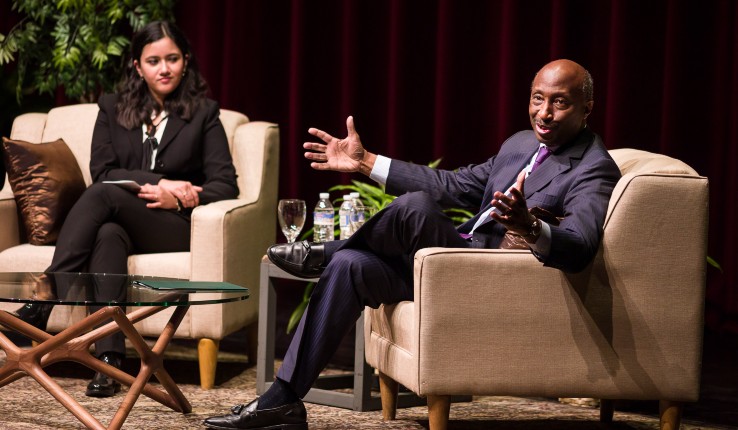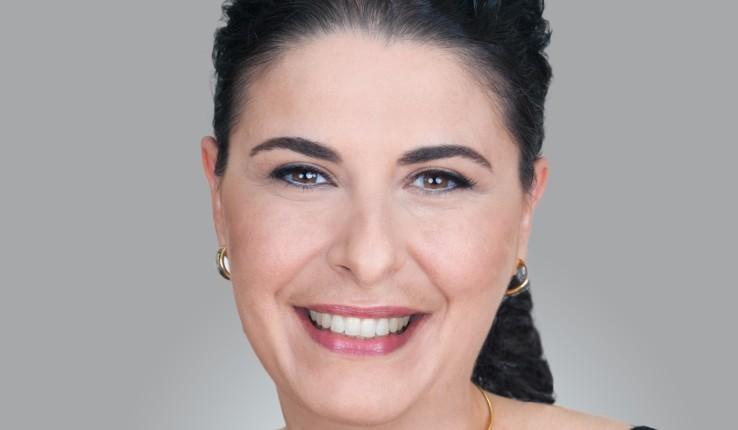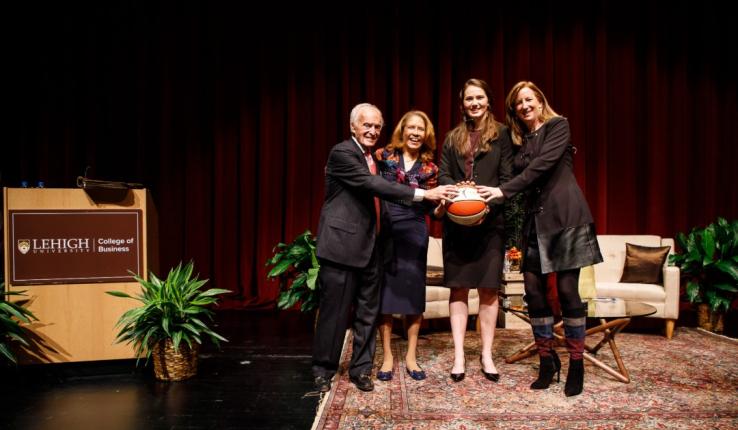Ken Frazier ’20P, executive chairman of the board of directors and former president and CEO of Merck, addressed hot-button issues of the day, such as vaccines and life during a pandemic, with thought and reason during the 13th Donald M. Gruhn ’49 Distinguished Finance Speaker Series held on Oct. 5, 2021.
Students, faculty, staff and members of the Lehigh community heard how Frazier balanced the company’s responsibilities to patients and society as a corporate citizen with the needs of its shareholders. The presentation, Societal Obligations of a Life Science Company, was held in the Zoellner Arts Center’s Baker Hall.
Nathan Urban, provost and vice president of academic affairs, thanked Judy and Don Gruhn ’49 for their patronage of the series that brings industry leaders to campus to share their experiences.
“We're deeply grateful for this opportunity to welcome another thought leader to campus,” Urban said.
Georgette Chapman Phillips, the Kevin L. ’84 ’13P and Lisa A. ’13P Clayton Dean of the College of Business, introduced Frazier and Shalvi Singh ’23G, who interviewed the keynote speaker about his life and career in a fireside chat format. Singh is a marketing professional with seven years of experience and a student in Lehigh’s 1-MBA program.
Frazier, who earned a bachelor’s degree from Penn State University and his juris doctor from Harvard Law School, began his career as an attorney in Philadelphia. He joined Merck in 1992 and held positions of increasing responsibility, including general counsel, before becoming president and CEO in 2011. After serving as president and CEO of Merck for 10 years, Frazier recently transitioned to the role of executive chairman of the company’s board of directors.
Under Frazier's leadership, Merck delivered innovative lifesaving medicines and vaccines as well as long-term and sustainable value to its multiple stakeholders. Frazier substantially increased Merck's investment in research while refocusing the organization on the launch and growth of key products that provide far-reaching benefits to society. He also led the formation of philanthropic and other initiatives that built on Merck's 130-year legacy.
Advocating for social justice and economic inclusion has been important to Frazier since early in his career. He is co-founder and co-chair of OneTen, a coalition of organizations committed to upskilling, hiring, and promoting one million Black Americans into family-sustaining jobs over the next 10 years.
“There are one million Black Americans who lack a four-year degree. Many companies require people to have a four-year degree, whether or not that degree is necessary to do the work. So we’re trying to get these companies to go from a credentials-based hiring approach to a skills-based one. There are 10 million job positions in this country that are open right now,” Frazier told the audience. “If we don’t think about training people to take those jobs, it’s actually going to hurt those companies as well.”
When asked about the COVID-19 pandemic and Merck’s response to it, Frazier said that when Merck’s attempts to develop a vaccine weren’t successful, they offered to utilize their manufacturing facilities to help Johnson & Johnson so the company could produce their vaccine at scale.
More recently, Frazier said, Merck’s researchers are developing an investigational oral antiviral medicine for the treatment of mild-to-moderate COVID-19. The application is for adults who are at risk of progressing to severe COVID-19, including hospitalization. The company is seeking U.S. Food and Drug Administration emergency use authorization for the experimental drug, called molnupiravir.
Frazier said vaccines must still be the first line of defense. “There are those who can’t get the vaccine, due to being on chemotherapy or having an immune system that’s compromised. Those people can’t choose to protect themselves from the virus, so those of us who are able-bodied need to do that—we have to protect one another,” he emphasized.
As for the anti-vax movement, Frazier said he’s concerned that “we can’t agree on facts any more in this country. But if people honestly believe in something, we have to engage them respectfully in a dialogue. But facts are facts, and science is science, and not everything that people choose to believe makes sense.”
Frazier addressed the high price of prescription drugs in the U.S. with an explanation of the business model of drug companies. “Our business model is different than any other, because 95% of the time, we fail. In engineering, the rules of physics are understood, but they’re more generalizable than the rules of human biology. So why drugs seem so expensive is, in a business where you have 95% losers, the 5% have to pay for the cost of the losers, as well as the cost of the next series of things that would be researched.”
The “soul” of a company is something Frazier says is integral to its purpose. “People look at companies from the outside as though they’re inanimate objects. But they’re full of living, breathing human beings. When I use the term ‘soul,’ I mean that people have a deeper purpose at Merck. We must create shareholder value, but I have 20,000 people in my research laboratories who get up every day, and they don’t ask, ‘How do we make more money?’ They ask, ‘How do we alleviate human suffering?’”
During a question-and-answer segment that followed the discussion, Frazier said his mentor, former Merck CEO Roy Vagelos, taught him everything he needed to know for his job. “Ultimately, he told me that the job of the CEO of Merck is to never do anything in your office that would make it less possible for some brilliant young scientists out there to come up with the next important drug.” —Cynthia Tintorri





